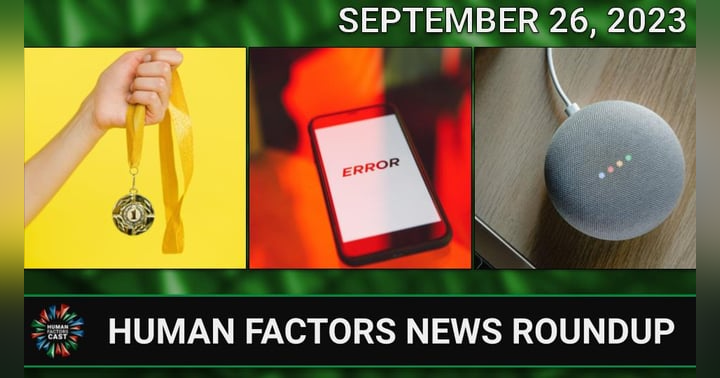April 13, 2021
Human Factors Weekly News (04/13/21)

Human Factors Weekly News (04/13/21)
Hey everyone, we're back with another week of Human Factors news!
As always, you'll find two categories of news stories:
- Our Top News Stories - These consist of news stories that we feel have enough substance to them to justify a 20-30 minute segment on the podcast (i.e. there's a lot of application/fun things for us to talk about). If you are not familiar with the podcast, we actually let our Patreons decide which topics we discuss on the show from these types of news stories.
- Human Factors News - These consist of news stories that have a human factors application, but may just be a brief one-liner (e.g. not a whole lot to talk about but cool enough for us to share).
If you're curious at all as to how we find and sort through this news, join Nick on Twitch for his office hours, every Tuesday from 11:00AM-12:00PM Pacific, 2:00PM-3:00PM Eastern.
Our Top News Stories
- Time to regulate AI that interprets human emotions
- Coronavirus (COVID-19) effects on New Jersey supply chains
- Ingenuity’s Chief Pilot Explains How to Fly a Helicopter on Mars
Human Factors News
- The technology acceptance scale: Its Bayesian psychometrics assessed in a factor analysis via Markov chain Monte Carlo models
- A Pandemic Playbook for Transportation Agencies
- Evaluation of an Automatic, Individual Computer-Based Driver Education and Training Program
- Elon Musk's Neuralink scientists are not the first to get a monkey to control a computer with its mind
- Pilot program to offer public transit credits for workers in Boston
- How To Make Autonomous Cars Trustworthy and Free from Cybersecurity Threats
- Are AI Algorithms Playing Fairly with Age, Gender, and Skin Color?
- Statistical prediction of the future impairs episodic encoding of the present
- Our Brain Typically Overlooks This Brilliant Problem-Solving Strategy - People often limit their creativity by continually adding new features to a design rather than removing existing ones
- Humans rely more on algorithms than social influence as a task becomes more difficult
- Varying demands for cognitive control reveals shared neural processes supporting semantic and episodic memory retrieval
If you haven't already, join us on Slack and Discord or on any of our social media communities (LinkedIn, Facebook, Twitter, Instagram)!
Human Factors Weekly News 22AUG2023
Human Factors Weekly News
Welcome to the Human Factors Cast Weekly News Roundup, a weekly roundup of all news related to Human Factors, Psychology, Design, and Technology as it relates to humans. These stories are selected as potential topics for H…
Human Factors Weekly News 22AUG2023
Human Factors Weekly News
Welcome to the Human Factors Cast Weekly News Roundup, a weekly roundup of all news related to Human Factors, Psychology, Design, and Technology as it relates to humans. These stories are selected as potential topics for H…






















